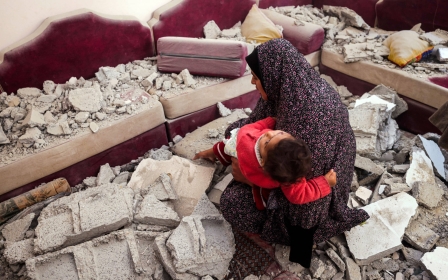War on Gaza: Barbie's Oscars ‘snub’ is used to shine a light on Palestinian women's plight

Social media platforms have been flooded with posts about feminism, patriarchy and intersectionality following the announcement of the 2024 Oscar nominees on Tuesday.
The Barbie movie, the highest-grossing film of 2023, was nominated for eight Academy Awards, but director Greta Gerwig and producer and lead actress Margot Robbie did not make the cut in their individual categories.
Thousands of disappointed fans took to social media to say the situation echoed the Barbie movie's plot, where the central characters grappled with recognition and acceptance amid a patriarchal society.
The snub not only triggered a storm of industry outrage, it also became a rallying point for many to draw attention to the gendered impact of Israel’s war on Gaza.
For example, renowned American makeup artist Matt Bernstein stated: "I loved Barbie and wish it had been nominated for more Oscars, but on the topic of gender issues: women in Gaza are currently using tent scraps as period products. I hope we can hold a similar level of outrage for them."
New MEE newsletter: Jerusalem Dispatch
Sign up to get the latest insights and analysis on Israel-Palestine, alongside Turkey Unpacked and other MEE newsletters
Others slammed the posts about Gerwig and Robbie as “peak white feminism” and also highlighted that a woman of colour, America Ferrera, was nominated for her supporting role in the film.
“We live in a world where ‘women using tents as pads during genocide’ was less of a feminist issue than ‘white lady pretending to be doll not considered great actress this year’,” said one user on X, formerly known as Twitter.
Since the Israeli onslaught on the Palestinian enclave began on 7 October, the total siege on Gaza has prevented hygiene and period products from entering the Strip.
UN estimates indicate around 700,000 women and girls in Gaza lack access to basic hygiene essentials during their menstrual cycles, including pads, toilet paper, running water and proper toilets.
Follow our live blog for all the latest on the Israel-Palestine war
Reports show that due to this severe scarcity, Palestinian women in Gaza are resorting to using tent strips as makeshift sanitary pads and undergoing caesarean procedures without anesthesia.
'Hillary said nothing'
Former US Secretary of State Hillary Clinton also took to social media to offer words of consolation to Gerwig and Robbie.
"You're both so much more than Kenough. #HillaryBarbie," she posted on Instagram and X.
However, Clinton's statement of solidarity ignited fierce criticism from social media users, who accused her of being hypocritical.
One user noted: "Last month, Israeli soldiers in Gaza shot 4 pregnant Palestinian women, then ran over their bodies with bulldozers. Hillary said nothing and kept opposing a ceasefire."
Social media critics accused Clinton of selective activism, stating that, despite her being "one of the most powerful women in the world" she focused her support on "rich, and privileged white women", neglecting to show sympathy for "thousands of women & girls killed by Israeli forces".
A report by UN Women on 19 January found that women and girls in Gaza are dying at “unprecedented levels” and facing “catastrophic levels of humanitarian need".
Of the more than 25,000 Palestinians killed since 7 October, 70 percent are estimated to be women and children, with two mothers killed every hour since the beginning of the crisis.
Middle East Eye delivers independent and unrivalled coverage and analysis of the Middle East, North Africa and beyond. To learn more about republishing this content and the associated fees, please fill out this form. More about MEE can be found here.




